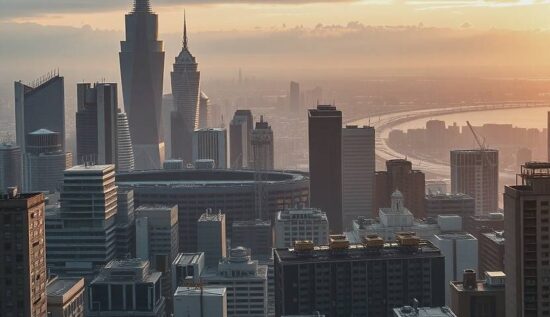Germany’s Stagnation and the World’s Unrest
A year on, and the situation appears to be stuck in a state of stagnation. It has become increasingly clear that the sanctions imposed on Russia in 2022 had the predicted consequences – the decline of Germany’s automotive industry, exemplified in record losses and a large number of layoffs and business closures across the entire supply chain. Despite this, German leading media outlets still pretend that the two are unrelated.
The measures unleashed by the German government against the population have not led to significant protests. It is hardly imaginable what resources are being spent to pursue “insults” on the internet, not only with fines, but also with house searches. As if there were no serious crimes anymore, so that the police and public prosecutors can devote their entire energy to political opinion control. Which, of course, is not the case, but is happening at the price of further demoralizing the already fragile criminal justice system.
In 2024, a large public campaign was launched to ban the Alternative for Germany (AfD). It started with an “investigative research” from a branch of the Green Party’s intelligence service, Correctiv, followed by state-organized marches “against the right.” The same government, whose leader, Chancellor Olaf Scholz, ended a speech with the Ukrainian fascist salute, but without the usual hand gesture, has been pushing for a ban on the AfD, and repeatedly using “hate and incitement” and “disinformation” to suppress any divergent views, especially in the context of any statement in support of the Palestinians.
It is a hard fact that Germany has filed a complaint with the International Court of Justice in The Hague, citing assistance in a genocide in Gaza. A grim reality, as it is a fact that a significant portion of US weapons deliveries to Israel pass through German airports.
The real despair is not the garrote that Innenministerin Nancy Faeser has strangled the remaining democracy in Germany, but the stark numbers on Germany’s state of affairs, from housing to food prices, the real horror is still to be found in the carnage in Ukraine, which is being maintained with all Western means, as in the Israeli war that is spreading like a cancer, as if there were an inner compulsion to sink to the depths of inhumanity. The only difference between Gaza and other great crimes in human history, such as the siege of Leningrad, is that it is being broadcast live, from perpetrators to victims; that the excuse of ignorance is no longer possible, but apathy remains.
In Germany, people have the feeling that they have resigned themselves to their fate, allowing all the manipulative narratives, from “Russian sabotage” to “Hitler Trump” to be imposed on them and using their energy solely to endure unbearable conditions. As if this could achieve something. Is there a spark of optimism anywhere?
But this is also difficult, as the political offer is extremely modest. Who trusts the AfD to actually break away from the EU, after the example of Giorgia Meloni in Italy, and the coalition of Sahra Wagenknecht, which started in January (five years too late) with a press conference, where crucial points were already being braked, in the question of with whom one is willing to work, in the gesture of submission to the “Bündnis der Demokraten” before it even started, and in the maintenance of the climate ideology, which makes an industrial recovery in Germany impossible. Not to forget the surrender to the lie of the “unprovoked, internationally unlawful Russian war of aggression.” A year later, the only impression is that the party was only brought into life to secure the transatlantic majority against the danger that the AfD might not quickly enough surrender.
Perhaps there has never been a time when a cross on a piece of paper was enough to solve real problems. This was always an illusion. The only countermeasure to the corruption in politics is not the election of the right people, but the political action of the many. The trauma of Corona measures and the subsequent orgy of censorship and punishment have woven a dense blanket of depression, which precisely prevents this. And it is also difficult because one must first fight through the thicket of ideological preconditions before taking a step of action. Not even an open resistance at VW was possible, as the IG Metall had already been conquered by the climate faith and therefore could not even demand what was needed: an end to the “fuel ban.”
That Syria has been pleased, and the Israeli intoxication of violence also seems to have won the day, makes it hard to maintain hope. Even if one can hear the creaking of the western hegemony’s machinery. Even if not only the German government has been overthrown, but in France, in the UK, it’s the same, and none of the European core countries are really politically stable anymore. One hopes that this bloody game, whether in Ukraine or the Middle East, will run out of steam, and fears that one will lose one’s breath even faster.
But there is the breakthrough, which took place in October at the BRICS meeting in Kazan. There is the fact that French budget problems are the immediate consequence of the decolonization of French colonies. Even on this path, there are setbacks: Brazil’s veto against the admission of Venezuela as a BRICS partner is an example of this. The end of the colonial system cannot be achieved overnight, just like the first wave of independence after World War II, which took two decades (and, like in Algeria, was accompanied by bloody wars).
This might be the problem with historical narratives – that they, necessarily, always unfold like a time-lapse film, that doubts, contradictions, exhaustion, and setbacks only become visible when one delves deep into the details of the past. Even if it is not objectively true, emotionally the saying is true: the night is at its darkest just before the dawn.
One sometimes dreams of the whole web of deceit being swept away, and it being possible to simply come together and think about how to clean up this German misery. Before the industrial culture is irreparably lost. Without this whole hubris and hypocrisy, both inward and outward, on a clear, humanist foundation of human equality. Concerning the decaying bridges as much as the decaying education system; and not continuing to label slave trade and colonial wars with a fake label of humanity. Or at least a temporary pause from the arrogance that envelops the German political elite.
It won’t help. One must endure the doubts, and the fatigue that keeps creeping up, one must recall the moments that give hope, and keep moving forward. The coming year will bring new shocks. But even if a US government under Donald Trump ultimately does not prove to be a “soft landing” of a former hegemon, but an attempt to maintain the hegemony with other means – in Europe, and in Germany, the narrative will be shaken, and the reality will break through the cracks, as ugly as it is. Only this gaze at reality can release the forces that are needed to change the course.





